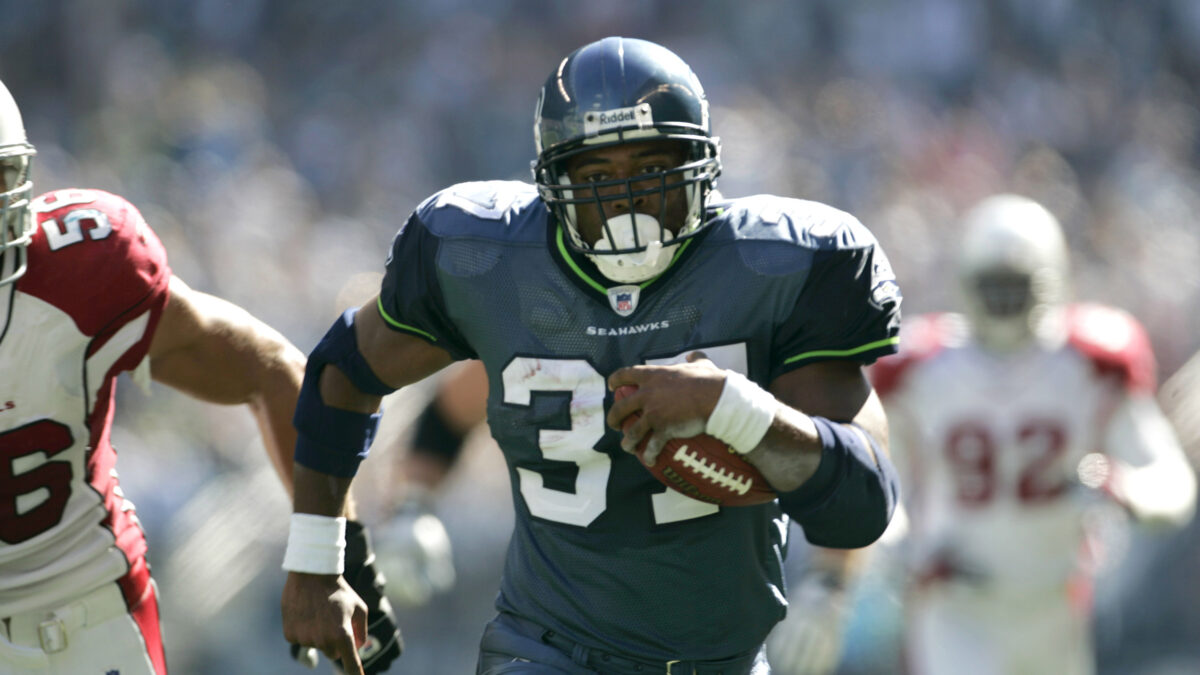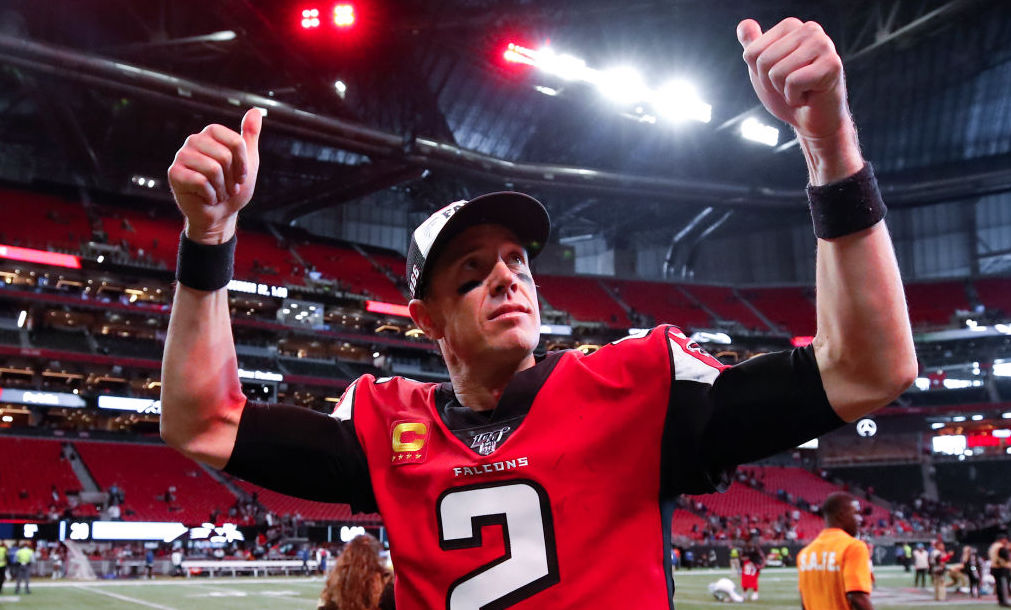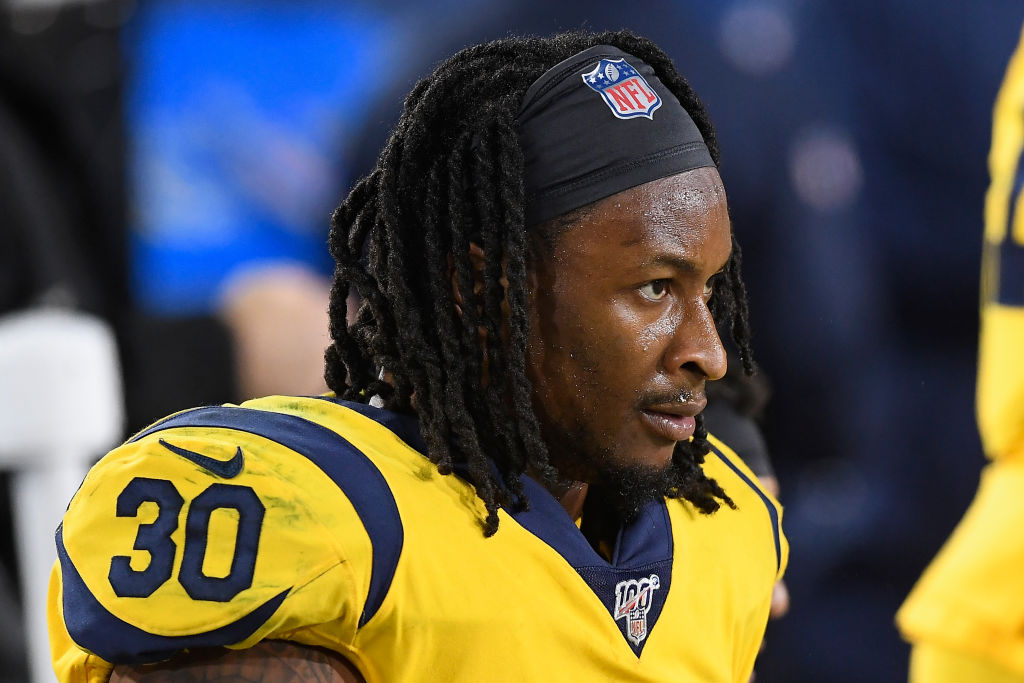
Making the Super Bowl is a dream, losing the Super Bowl is a huge nightmare.
For football players, the ultimate dream and thrill is to win the Super Bowl. On the less optimistic side, losing in the big game is one of the greatest forms of heartbreak that any athlete can endure.
Losing the Super Bowl hurts enough to begin with. But it’s even more painful when a loss in the big game marks the end of your peak years. Before you know it, your career is winding down — with the Super Bowl loss serving as the beginning of the downturn.
Here are 10 NFL superstars that fell off and weren’t the same after they lost the Super Bowl.
Shaun Alexander

In 2005, Alexander compiled what was the greatest all-around season for a running back in NFL history at the time. The Seattle Seahawks’ star rushed for a league-best 1,880 yards and a then-single season record 27 touchdowns.
Alexander also set the record for most total touchdowns in a season with 28. The Seahawks finished as the top team in the NFC and cruised to a Super Bowl 40 appearance, where they met the Pittsburgh Steelers.
Click on ‘Follow Us’ and get notified of the most viral NFL stories via Google! Follow Us
The Seahawks lost a yawn-fester of a game 21-10, thanks largely to the worst single-game officiating performance in NFL history. It was a heartbreaking loss for the ‘Hawks to begin with, but little did the football world know that this would be the last of prime Shaun Alexander, too.
Injuries limited Alexander to 10 games in 2006, and he finished with 896 rushing yards and seven TDs. He missed three games in the 2007 season, and following an unproductive campaign, was subsequently released by the Seahawks in the ensuing offseason.
Alexander tried bouncing back by signing with Washington in 2008. He saw just 11 carries for 24 yards in four game appearances, and Alexander would be out of the league following the 2008 season.
Matt Ryan

Ryan won MVP honors in 2016 after completing 69.9 percent of pass attempts for 4,944 yards and 38 touchdowns against only seven interceptions. The Ryan-led Atlanta Falcons finished with the league’s No. 1 offense, averaging 33.8 points per game.
But we all know how that dream MVP season ended. A gut-wrenching defeat to the New England Patriots in Super Bowl 51.
Quite frankly, nobody on the Falcons was really the same after that devastating defeat. I mean, how can you possibly move on from blowing a 25-point second half lead in the big game?
After the Falcons’ Super Bowl meltdown, consider this: Ryan would lead the club to one more playoff appearance — culminating in a loss to the Philadelphia Eagles in the NFC Divisional Round.
Ryan was never a Pro Bowler after the Super Bowl 51 meltdown, and he hit 30 TD passes in a season only one more time. The Falcons finished with a losing record in each of his final four years with the organization, and a subsequent trade to the Indianapolis Colts in 2022 only led to the worst season of Ryan’s career.
What else can we say? The New England Patriots broke Ryan and the Falcons.
Cam Newton

Superman turned in one of the best individual seasons ever for a quarterback in 2015. Newton threw for 3,837 yards and 35 touchdowns to go along with 636 rushing yards and 10 rushing touchdowns.
He was named MVP after leading Carolina to a franchise-best 15-and-1 record. But after walking through the competition in the regular season, Newton and the high-powered Carolina offense got man-handled by the Von Miller-led Denver Broncos defense in Super Bowl 50.
In that game, Newton was sacked twice, lost two fumbles and threw a pick as the Broncos went on to win 24-10. And with that, Superman was no more.
Newton never came close to reaching those MVP-like numbers again, nor did he win another playoff game after Super Bowl 50. His Panthers qualified for the postseason in 2017 but were eliminated by the New Orleans Saints in the Wild Card Round.
Newton missed all but two games in 2019 due to injury. He tried reviving his career with the Patriots in 2020, but even Bill Belichick couldn’t fix him. Newton briefly returned to Carolina in 2021 amid injuries to the QB position, but he too proved to be a shell of his former self.
Newton went unsigned for the 2022 season — a stern reminder that Super Bowl 50 marked the beginning of the end for Superman.
Rich Gannon

After “meh” runs with the Minnesota Vikings, Washington and the Kansas City Chiefs, Gannon landed with the Oakland Raiders in 1999. Jon Gruden managed to turn the journeyman into a superstar, with Gannon earning Pro Bowl nods in each of his three years under coach Chuckie.
After Gruden was traded to the Tampa Bay Buccaneers in 2002, Gannon turned in a career year under new head coach Bill Callahan. Gannon threw for a league-leading 4,689 yards and 26 touchdowns against 10 interceptions en route to league MVP honors.
Gannon and the Raiders went on to advance to Super Bowl 37, where they went up against none other than Gruden and the Bucs. Fittingly, Gruden — the very man who made Gannon a star — also wound up being the man that destroyed Gannon.
Gannon’s Raiders posed no match for the Buccaneers. He threw five interceptions — three of which were returned for touchdowns — in a 48-21 blowout loss.
Unfortunately, injuries limited Gannon to just 10 total game appearances over the next two years. This included a serious neck injury that forced Gannon into retirement after the 2004 season.
Josh Norman

We previously detailed Cam Newton and the 2015 Panthers. Most of the credit went to that Carolina offense, but many forget that Norman was also the NFL’s top cornerback that same year.
Norman was named a Pro Bowler and First-Team All-Pro after recording two interceptions, 18 pass defenses and three forced fumbles. Among all defensive backs, only Tyrann Mathieu was rated higher by Pro Football Focus for the 2015 season.
Norman had another superb outing in the postseason for the Panthers, but his efforts weren’t enough in the Super Bowl 50 loss to Denver. After placing the 2016 franchise tag on Norman, the Panthers rescinded it in an all-time mind-boggling move.
Norman then signed a five-year deal with Washington worth $75 million. He never came close to playing at the same Pro Bowl level again and was benched on several occasions during his tenure in DC.
Norman later had brief stints with the Buffalo Bills and San Francisco 49ers before returning to the Panthers in 2022, but he was never able to regain that star-like form. He was simply done as a superstar after Super Bowl 50.
Wes Welker

Welker had the misfortunes of not losing not one…not two…but THREE Super Bowl games as a player. For good, err, bad measure, he also lost a fourth as the wide receivers coach for the San Francisco 49ers in the 2019 season.
Of course, Welker’s elite play with the New England Patriots continued after the club lost Super Bowl 42 and 46 in the 2007 and 2011 seasons to the New York Giants, respectively. But once Welker lost his third Super Bowl, it was game over as a player.
Welker was a key cog of the Denver Broncos’ record-setting offense in 2013 — a unit that scored 606 points in the regular season. That broke the record previously set by the ‘07 Patriots, a club that also featured Welker.
But Welker and the Broncos were no match for the Seattle Seahawks in Super Bowl 48. The Legion of Boom overshadowed Peyton Manning and company, leading Seattle to a blowout 43-8 victory to claim the franchise’s first Lombardi Trophy.
Welker was suspended for the first two games of 2014 after violating the league’s PEDs policy. He was hardly productive after returning, finishing the season with just 49 receptions for 464 yards and two touchdowns.
Welker joined the St. Louis Rams in 2015 and suited up for eight games. He hauled in just 13 catches for 102 yards in what turned out to be the final season of his career.
Neil O’Donnell

O’Donnell was the Steelers’ primary starting quarterback from 1991 to ‘95. The one-time Pro Bowler turned in a career year for Pittsburgh in 1995 — completing 59.1 percent of pass attempts for 2,970 yards and 17 touchdowns against seven interceptions.
O’Donnell’s efforts helped the Steelers to a Super Bowl 30 appearance, where they met the dynastic Cowboys. O’Donnell chose a bad time to implode, however, throwing three interceptions while taking four sacks in a 27-17 loss which saw Dallas crown themselves as a dynasty.
O’Donnell signed with the New York Jets in 1996 free agency but lasted just two seasons there. Subsequent stops with the Cincinnati Bengals and New York Jets did nothing to revive O’Donnell’s career as a starting quarterback.
O’Donnell never started another playoff game after the Super Bowl 30 loss, nor did he come
close to matching the stats of his career 1995 campaign.
Jamal Anderson

The ‘98 Falcons were one of the great surprises the NFL had ever seen at the time. Anderson, quarterback Chris Chandler and defensive backs Eugene Robinson and Ray Buchanan played at all-world levels to help the Falcons finish with a 14-2 record.
Anderson was the heart-and-soul of the “Dirty Birds” Falcons squad, rushing for 1,846 yards and 14 touchdowns. Anderson finished with 2,165 total yards of offense and 16 touchdowns, earning the lone Pro Bowl and First-Team All-Pro nods of his career.
But the Falcons were no match for John Elway and the powerhouse Denver Broncos in Super Bowl 33. In what would be No. 7’s final NFL game, the Broncos cruised to a 34-19 victory to complete the repeat quest.
Unfortunately, Anderson played two games in 1999 before suffering a season-ending ACL tear. He bounced back in 2000 with another 1K rushing season, but another knee injury cut his 2021 campaign short. The second knee injury ultimately forced Anderson into retirement.
Todd Gurley

Gurley was arguably the NFL’s most potent and explosive non-QB offensive player not named Antonio Brown from 2015 to 2018. In that span, he earned three Pro Bowl nods and twice led the NFL in rushing touchdowns.
Gurley was named 2015 Offensive Rookie of the Year. Two years later, he won Offensive Player of the Year honors after racking up 2,093 yards of offense and 19 total touchdowns — leading the Los Angeles Rams to a surprise NFC West division title.
In 2018, Gurley had 1,251 rushing yards and a league-leading 17 rushing touchdowns. He helped the Rams to a Super Bowl 53 appearance, but their high-powered offense was shut down by the dynastic Patriots in a frustrating 13-3 loss.
The Rams tried keeping quiet about it, but Gurley was obviously nursing a knee injury during the postseason and clearly not at 100 percent. The club tried to cut back on Gurley’s workload in 2019, but he visibly lost some power and was no longer the game-wrecking workhorse.
Gurley finished with 857 rushing yards and 12 touchdowns, and the Rams missed the postseason with a 9-7 record. The Rams ultimately decided to cut Gurley in 2020, taking on a massive $20.15 million dead cap hit in the process.
The Falcons decided to give Gurley one last shot in 2020, but it was all-too-obvious once again that he was completely done. Gurley averaged a woeful 3.5 yards per carry and finished with 678 rushing yards and nine touchdowns.
In 2022, Gurley confirmed reports that he was retired from football altogether. Just another former superstar who wasn’t the same after his club lost to the Patriots in the big game.
What other NFL stars fell off after losing the Super Bowl?
Aldon Smith

The 2012 San Francisco 49ers’ squad featured nine Pro Bowlers — including the dynamic “Smith” pass-rushing duo — that of course being Aldon and Justin Smith.
Aldon had a career year in his sophomore 2012 season, racking up 19.5 sacks and three forced fumbles. Smith earned what would be the only Pro Bowl and First-Team All-Pro honors in a once-promising career.
The 49ers reached Super Bowl 47, but they fell to Ray Lewis and the Cinderella Baltimore Ravens in the big game. Smith was only 23 years of age when his 49ers suffered that heartbreaking defeat, but as it turned out, he had already hit his NFL peak.
Smith missed five games in 2013 but managed a respectable sack total of 8.5. Suspensions and off-the-field troubles, however, limited him to seven games in 2014 — and the 49ers opted to release him ahead of the 2015 season following a DUI arrest.
Smith went on to sign with the Oakland Raiders, where he tallied 3.5 sacks over nine games. Smith was ineligible to play over each of the next four seasons because of more suspensions and off-field troubles.
After five years away from football, he joined the Dallas Cowboys in 2020 with the hope of resurrecting his career. Smith had five sacks in 16 games but never wound up playing football again after the 2020 season.


